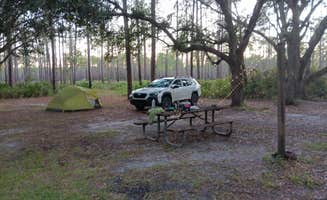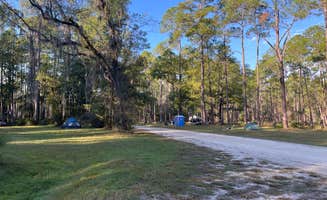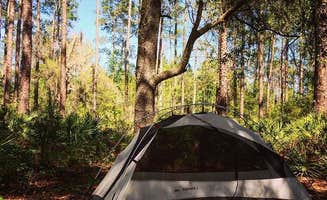Dispersed camping near Bell, Florida primarily takes place within Osceola National Forest, offering primitive sites where campers can experience Florida's wilderness without established facilities. Winter temperatures average 45-65°F while summer months see 75-95°F with high humidity. Roads accessing these rustic camps become challenging during Florida's rainy season, particularly from June through September when afternoon thunderstorms are common.
What to do
Wildlife observation: Osceola National Forest hosts diverse wildlife including deer, wild turkeys, and numerous bird species. At West Tower Hunt Camp, campers report excellent wildlife viewing opportunities. "My first night here was fantastic. I can stay up to two weeks here. It's December and there was only two other people camping here my site. I couldn't even see anybody," notes Dan B.
Fishing: Small ponds throughout the forest provide fishing opportunities, particularly at 17 Mile Hunt Camp. One camper mentioned, "We got an amazing spot with a view of the pond," highlighting the accessible water features. Local anglers recommend morning hours for best results.
Book exchange: West Tower Hunt Camp maintains a unique book exchange in their bathroom facility. As J A. notes, "Nice spots with a bathroom book exchange and power at the bathroom if you need it," providing a welcome amenity for readers seeking entertainment during their stay in this remote area.
What campers like
Privacy between sites: The dispersed nature of these camping areas offers seclusion. Will J. shares about 17 Mile Hunt Camp: "It was really peaceful. There were only a few other people there and we hardly ever saw them." Many sites provide natural separation with palmetto undergrowth creating boundaries.
Cost-free camping: These rustic camps offer free accommodations with basic amenities. At Cobb Hunt Camp, DeziRay M. appreciates that it's "Free no water or electricity, porta-potties. Most campers stay to themselves and there's room for privacy."
Natural flat terrain: The forest landscape provides naturally level sites requiring minimal setup effort. One camper at 17 Mile Hunt Camp reported, "We didn't even need to level the camper - it was naturally flat," making the area particularly accommodating for both tent and vehicle camping.
What you should know
Closures and accessibility: Campgrounds in this area may close without notice. At Cobb Hunt Camp, Chris D. noted, "Cobb Camp Osceola is closed though the website makes no mention of the closure. There are people camping just beyond the campground without issue." When faced with closures, campers often find nearby alternatives.
Communication limitations: Cell service ranges from spotty to non-existent. Brian reported about 17 Mile Hunt Camp: "No Verizon cell service," while another camper stated, "Minimal, if any, cell service, so you will be disconnected pretty much." Plan accordingly with offline maps and emergency preparations.
Weather considerations: Ground conditions can deteriorate quickly with rain. Chrischelle N. warns, "Just make sure to check the ground before you park. Very muddy, could get stuck." Forest roads often become impassable for standard vehicles during wet periods.
Tips for camping with families
Safety precautions: Small wildlife may pose risks to pets and children. Will J. cautions, "We did have to be extra careful with our little dog tho because we did get the sense that something could try to eat it since the sites are in the middle of the woods. We generally felt safe tho and just made sure to take bear spray."
Activity planning: Without modern amenities, prepare offline entertainment. Patrick M. from 17 Mile Hunt Camp suggests, "No tv stations, I brought movies, really enjoyed myself." Board games and outdoor activities help keep children engaged.
Site selection: Choose sites with natural play areas. Aliyah B. recommends, "Loved this spot. It had tons of space with space between camp spots. Quiet. Lots of locals during the day but settles down at night." The open spaces allow for safer exploration for children.
Tips from RVers
Ground assessment: RV campers must thoroughly check ground stability before parking. Will J. advises from experience at 17 Mile Hunt Camp, "We did a few loops looking for a good site. It was pretty easy to see where the areas for camping are but it's not as clear as a paid RV park."
Boondocking preparation: These sites require full self-sufficiency. Patrick M. shares, "I'm in a travel trailer so I had the chance to take advantage of all the amenities my camper has to offer," emphasizing the importance of having operational onboard systems for water, waste, and power.
Size limitations: Smaller RVs and trailers navigate these areas more successfully. Chrischelle N. notes, "Nice primitive campground with well maintained dispersed spots. No picnic tables or fire rings but plenty of space. Nice and quiet. Lots of space for RVs as well." Most sites accommodate smaller trailers under 26 feet, while larger rigs may struggle with access roads and turning radius.




